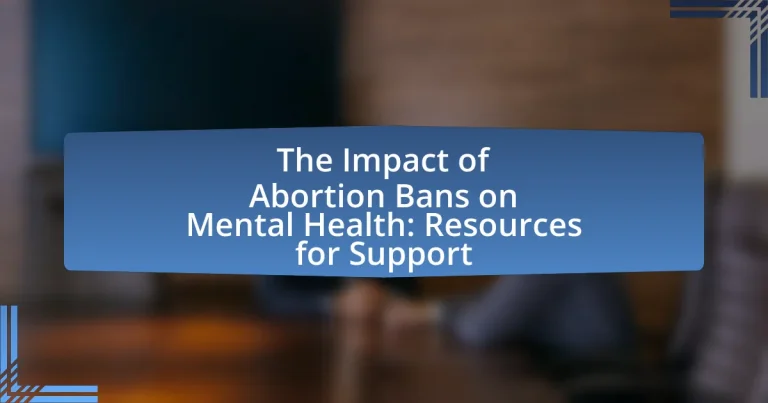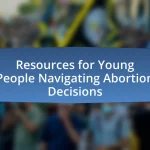The article examines the significant mental health impacts of abortion bans, highlighting how such restrictions lead to increased anxiety, depression, and feelings of loss among individuals denied access to abortion services. Research indicates that those forced to carry unwanted pregnancies experience higher rates of psychological distress compared to those who can obtain abortions. The article also discusses the role of personal circumstances, societal stigma, and the importance of understanding these mental health implications to develop effective support systems. Additionally, it outlines available resources for individuals affected by abortion bans and emphasizes the role of mental health professionals in providing necessary support and coping strategies.
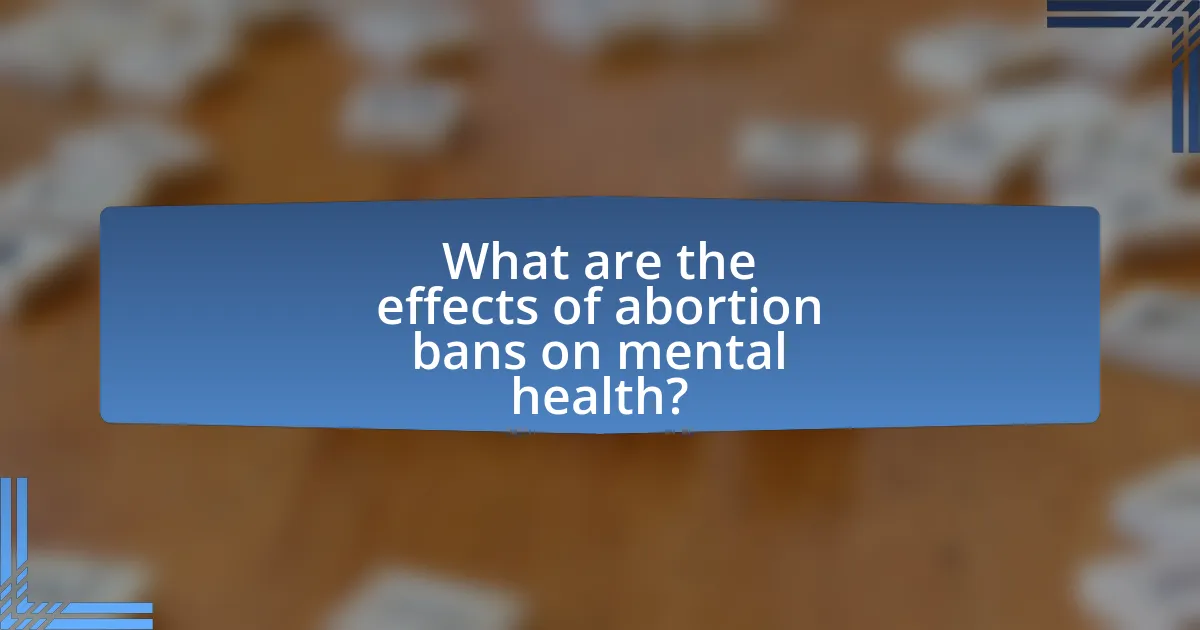
What are the effects of abortion bans on mental health?
Abortion bans negatively affect mental health by increasing anxiety, depression, and feelings of loss among individuals denied access to abortion services. Research indicates that individuals who are forced to carry an unwanted pregnancy to term experience higher rates of mental health issues compared to those who can access abortion. A study published in the American Journal of Psychiatry found that women denied abortions were more likely to experience anxiety and lower life satisfaction over a two-year period compared to those who received the procedure. Additionally, the Turnaway Study, conducted by the University of California, San Francisco, revealed that women who were denied abortions reported higher levels of psychological distress and poorer mental health outcomes. These findings underscore the significant mental health implications associated with restricting access to abortion services.
How do abortion bans influence emotional well-being?
Abortion bans negatively influence emotional well-being by increasing anxiety, depression, and feelings of loss among individuals who are denied access to abortion services. Research indicates that individuals facing unwanted pregnancies often experience heightened stress and emotional turmoil, which can lead to long-term mental health issues. A study published in the American Journal of Public Health found that women who were denied abortions were more likely to experience anxiety and lower life satisfaction compared to those who received the procedure. This evidence underscores the detrimental effects of abortion restrictions on mental health, highlighting the importance of access to reproductive healthcare for emotional stability.
What specific mental health issues are associated with abortion bans?
Abortion bans are associated with several specific mental health issues, including increased rates of anxiety, depression, and post-traumatic stress disorder (PTSD). Research indicates that individuals denied abortions are more likely to experience these mental health challenges compared to those who are able to access abortion services. A study published in the journal “JAMA Psychiatry” found that women who were denied an abortion reported higher levels of anxiety and depression over a five-year period compared to those who received the procedure. Additionally, the stress of being forced to carry an unwanted pregnancy to term can exacerbate existing mental health conditions and lead to feelings of hopelessness and loss of autonomy.
How do personal circumstances affect mental health outcomes after an abortion ban?
Personal circumstances significantly influence mental health outcomes after an abortion ban, as factors such as socioeconomic status, existing mental health conditions, and support systems can exacerbate stress and anxiety. Research indicates that individuals with lower socioeconomic status may experience heightened feelings of helplessness and depression due to limited access to resources and support. Additionally, those with pre-existing mental health issues are at a greater risk of experiencing negative mental health outcomes, as the stress of an abortion ban can trigger or worsen these conditions. A study published in the American Journal of Public Health found that individuals denied abortions were more likely to report anxiety and lower life satisfaction compared to those who were able to obtain the procedure, highlighting the critical role personal circumstances play in shaping mental health outcomes in the context of abortion restrictions.
Why is understanding the mental health impact of abortion bans important?
Understanding the mental health impact of abortion bans is important because these restrictions can lead to significant psychological distress for individuals who are denied access to abortion services. Research indicates that individuals facing unwanted pregnancies often experience increased anxiety, depression, and feelings of helplessness, particularly when they are unable to make decisions about their reproductive health. A study published in the American Journal of Public Health found that women who were denied abortions were more likely to experience mental health issues compared to those who received the procedure. This highlights the critical need for mental health support and resources for those affected by such bans.
What role does societal stigma play in mental health outcomes?
Societal stigma significantly worsens mental health outcomes by creating barriers to seeking help and fostering feelings of shame and isolation among individuals with mental health issues. Research indicates that individuals facing stigma are less likely to access mental health services, which can lead to untreated conditions and exacerbated symptoms. For instance, a study published in the journal “Psychological Medicine” found that stigma is associated with increased psychological distress and lower rates of treatment adherence. This correlation highlights how societal perceptions can directly impact the mental well-being of affected individuals, ultimately leading to poorer health outcomes.
How can awareness of these impacts lead to better support systems?
Awareness of the impacts of abortion bans on mental health can lead to better support systems by informing policymakers and healthcare providers about the specific needs of affected individuals. When stakeholders understand the psychological consequences, such as increased anxiety and depression rates among those denied abortions, they can develop targeted interventions and resources. For instance, a study published in the American Journal of Public Health found that women denied abortions were more likely to experience mental health issues compared to those who received the procedure. This evidence underscores the necessity for mental health services and support networks tailored to the unique challenges faced by these individuals, ultimately fostering a more responsive and effective support system.
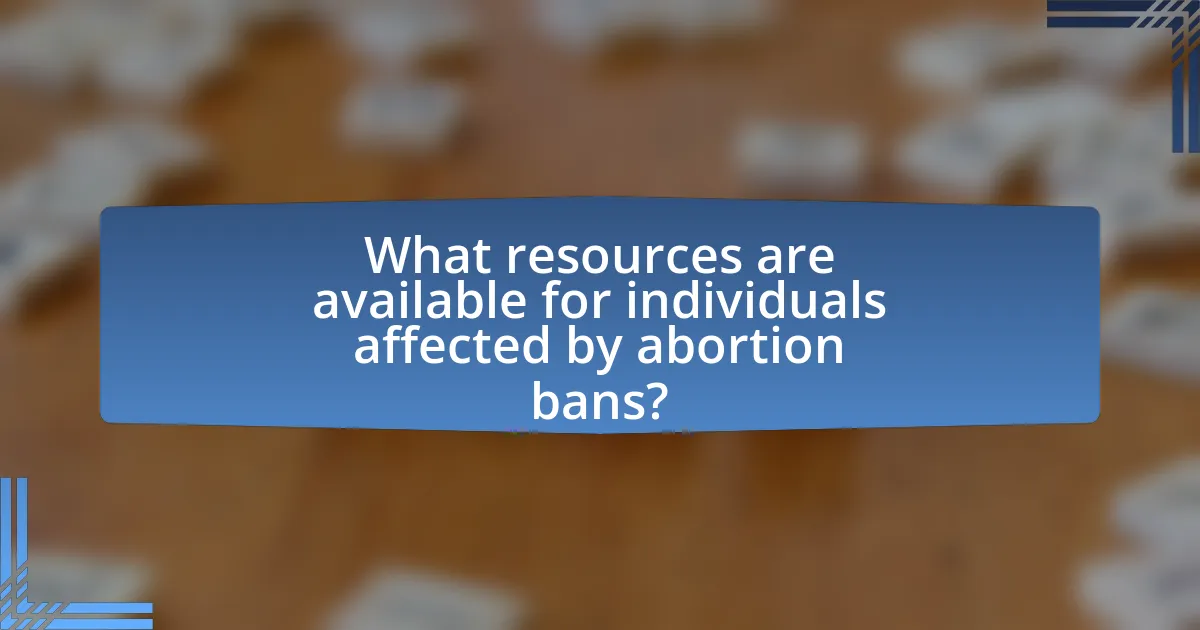
What resources are available for individuals affected by abortion bans?
Individuals affected by abortion bans can access various resources, including reproductive health organizations, mental health support services, and legal assistance. Organizations such as Planned Parenthood and the Guttmacher Institute provide information on reproductive rights and health services. Mental health resources include the National Alliance on Mental Illness (NAMI) and local counseling services that offer support for emotional distress related to reproductive issues. Legal assistance can be found through groups like the Center for Reproductive Rights, which helps individuals understand their rights and navigate legal challenges. These resources are crucial for addressing the mental health impacts of abortion bans, as studies indicate that restrictions can lead to increased anxiety and depression among affected individuals.
How can mental health professionals assist those impacted by abortion bans?
Mental health professionals can assist those impacted by abortion bans by providing emotional support, counseling, and resources tailored to their specific needs. These professionals can help individuals process feelings of grief, anxiety, and anger that may arise from the loss of reproductive autonomy. Research indicates that individuals facing restrictive abortion laws often experience increased mental health issues, including depression and anxiety (American Psychological Association, 2020). By offering therapeutic interventions, mental health professionals can facilitate coping strategies and resilience-building, ultimately improving the overall mental well-being of those affected.
What types of therapy are most effective for individuals facing these challenges?
Cognitive Behavioral Therapy (CBT) and Dialectical Behavior Therapy (DBT) are the most effective types of therapy for individuals facing mental health challenges related to abortion bans. CBT helps individuals identify and change negative thought patterns and behaviors, which can alleviate symptoms of anxiety and depression often experienced in such situations. Research indicates that CBT can significantly reduce these symptoms, with studies showing a 50-75% improvement in patients after treatment. DBT, on the other hand, focuses on emotional regulation and interpersonal effectiveness, providing skills to cope with distressing emotions and improve relationships. Evidence supports DBT’s efficacy in reducing self-harm and suicidal ideation, which can be heightened in individuals facing the stress of abortion bans.
How can support groups provide relief and understanding?
Support groups provide relief and understanding by creating a safe space for individuals to share their experiences and emotions related to abortion bans. This communal environment fosters empathy and validation, which are crucial for mental health recovery. Research indicates that individuals who participate in support groups report lower levels of anxiety and depression, as they feel less isolated in their struggles. A study published in the Journal of Affective Disorders found that peer support significantly enhances emotional well-being by allowing members to express feelings and receive feedback from others who have faced similar challenges.
What online resources exist for mental health support related to abortion bans?
Online resources for mental health support related to abortion bans include organizations such as the National Abortion Federation, which offers a helpline for emotional support, and the American Psychological Association, which provides information on mental health impacts and resources. Additionally, websites like Planned Parenthood and the Guttmacher Institute offer educational materials and links to counseling services. These resources are crucial as studies indicate that restrictive abortion laws can lead to increased anxiety and depression among affected individuals, highlighting the need for accessible mental health support.
Which websites offer reliable information and support networks?
Websites that offer reliable information and support networks include Planned Parenthood, the American Psychological Association, and the National Abortion Federation. Planned Parenthood provides comprehensive resources on reproductive health and mental well-being, including access to counseling services. The American Psychological Association offers research-based insights into the psychological effects of abortion and access to mental health professionals. The National Abortion Federation provides a directory of abortion providers and support services, ensuring individuals can find the help they need. These organizations are recognized for their credibility and commitment to providing accurate information and support related to reproductive health and mental health issues.
How can social media be used positively for support and advocacy?
Social media can be used positively for support and advocacy by creating platforms for individuals to share their experiences and connect with others facing similar challenges. These platforms facilitate the dissemination of information regarding mental health resources, legal rights, and community support networks, which are crucial for those affected by abortion bans. For instance, campaigns like #ShoutYourAbortion have empowered individuals to openly discuss their experiences, reducing stigma and fostering a sense of community. Research indicates that online support groups can significantly improve mental health outcomes by providing emotional support and practical advice, as highlighted in a study published in the Journal of Medical Internet Research, which found that participants in online forums reported increased feelings of empowerment and reduced isolation.
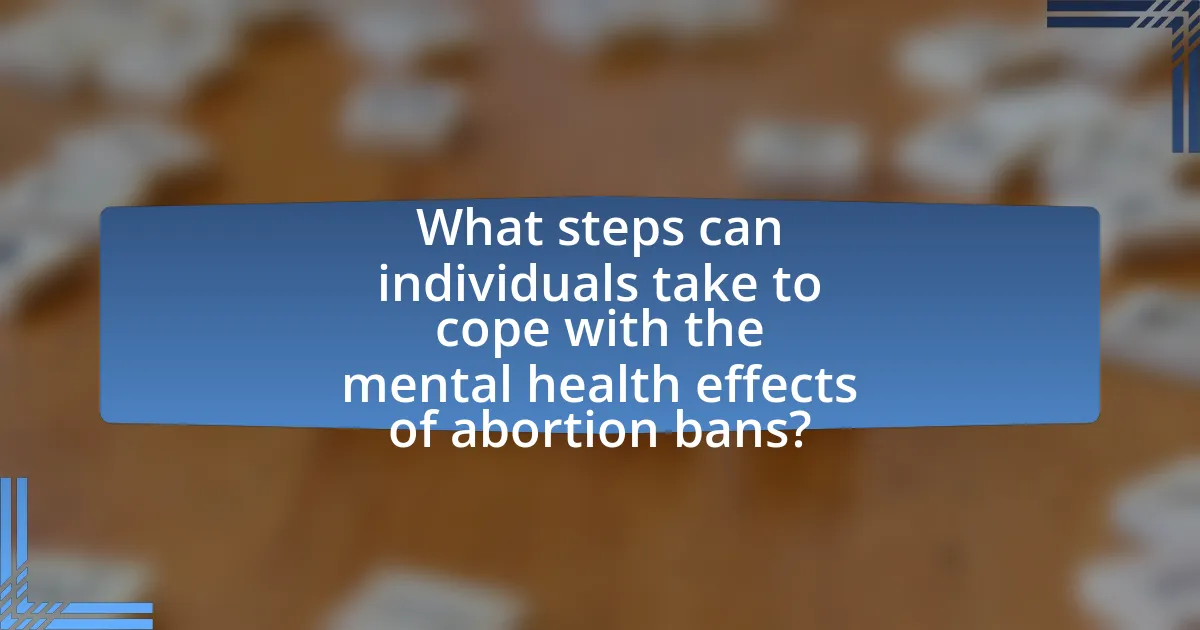
What steps can individuals take to cope with the mental health effects of abortion bans?
Individuals can cope with the mental health effects of abortion bans by seeking professional counseling, engaging in support groups, and practicing self-care strategies. Professional counseling provides a safe space to process emotions and develop coping mechanisms, while support groups offer shared experiences and validation from others facing similar challenges. Additionally, self-care strategies such as mindfulness, exercise, and journaling can help individuals manage stress and anxiety. Research indicates that access to mental health support significantly reduces the negative psychological impacts associated with restrictive reproductive policies, highlighting the importance of these coping steps.
How can self-care practices improve mental health in this context?
Self-care practices can significantly improve mental health in the context of abortion bans by providing individuals with coping mechanisms to manage stress and emotional distress. Engaging in self-care activities, such as mindfulness, exercise, and social support, has been shown to reduce anxiety and depression levels. For instance, a study published in the Journal of Affective Disorders found that individuals who practiced self-care reported lower levels of psychological distress during challenging situations. By prioritizing self-care, individuals can foster resilience and enhance their overall well-being, which is particularly crucial in the emotionally charged environment surrounding abortion bans.
What specific self-care strategies are recommended for those affected?
Specific self-care strategies recommended for those affected by abortion bans include engaging in mindfulness practices, seeking social support, and maintaining a healthy routine. Mindfulness practices, such as meditation and deep-breathing exercises, help reduce anxiety and improve emotional regulation. Research indicates that mindfulness can significantly lower stress levels and enhance overall well-being. Seeking social support from friends, family, or support groups provides emotional validation and reduces feelings of isolation, which is crucial for mental health recovery. Additionally, maintaining a healthy routine that includes regular exercise, balanced nutrition, and adequate sleep contributes to improved mood and resilience. Studies show that physical activity releases endorphins, which can alleviate symptoms of depression and anxiety.
How can mindfulness and stress reduction techniques help?
Mindfulness and stress reduction techniques can significantly enhance mental well-being by promoting emotional regulation and reducing anxiety. These practices, such as meditation and deep-breathing exercises, have been shown to lower cortisol levels, which is a hormone associated with stress. Research indicates that individuals who engage in mindfulness practices report decreased symptoms of depression and anxiety, as evidenced by a meta-analysis published in JAMA Internal Medicine, which found that mindfulness meditation programs can improve anxiety, depression, and pain. By fostering a greater awareness of the present moment, these techniques help individuals manage their emotional responses, particularly in high-stress situations, such as those arising from the impact of abortion bans on mental health.
What are the best practices for seeking help and support?
The best practices for seeking help and support include identifying trusted individuals or professionals, clearly articulating your needs, and utilizing available resources. Trusted individuals can include friends, family, or mental health professionals who can provide emotional support and guidance. Clearly articulating your needs ensures that those you reach out to understand your situation and can offer appropriate assistance. Utilizing available resources, such as hotlines, support groups, or counseling services, can provide structured support tailored to your specific circumstances. Research indicates that individuals who actively seek support during challenging times experience improved mental health outcomes, highlighting the importance of these practices.
How can individuals identify when to seek professional help?
Individuals can identify when to seek professional help by recognizing persistent feelings of distress, anxiety, or depression that interfere with daily functioning. Research indicates that symptoms such as prolonged sadness, changes in appetite or sleep patterns, and difficulty concentrating may signal the need for professional intervention. According to the American Psychological Association, seeking help is crucial when emotional pain becomes overwhelming or when coping strategies are ineffective.
What should individuals look for in a mental health provider?
Individuals should look for a mental health provider who is licensed, experienced, and specializes in the specific issues they are facing, particularly those related to the impact of abortion bans on mental health. A licensed provider ensures that they have met the necessary educational and professional standards, while experience in the relevant field indicates their familiarity with the complexities surrounding mental health challenges linked to reproductive health. Specialization in trauma, grief, or reproductive health issues is crucial, as these areas directly relate to the emotional and psychological effects of abortion bans. Research shows that individuals who seek care from specialized providers report higher satisfaction and better outcomes in managing their mental health concerns.
